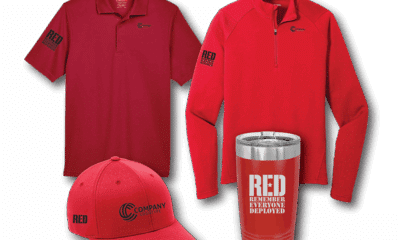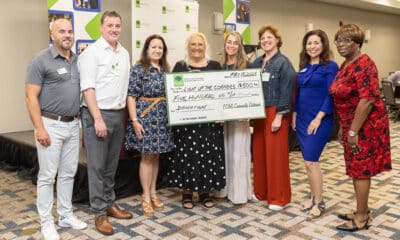Business
The Pharmacy Business and People’s Access to Prescriptions During COVD-19 [Podcast]
Published
5 years agoon
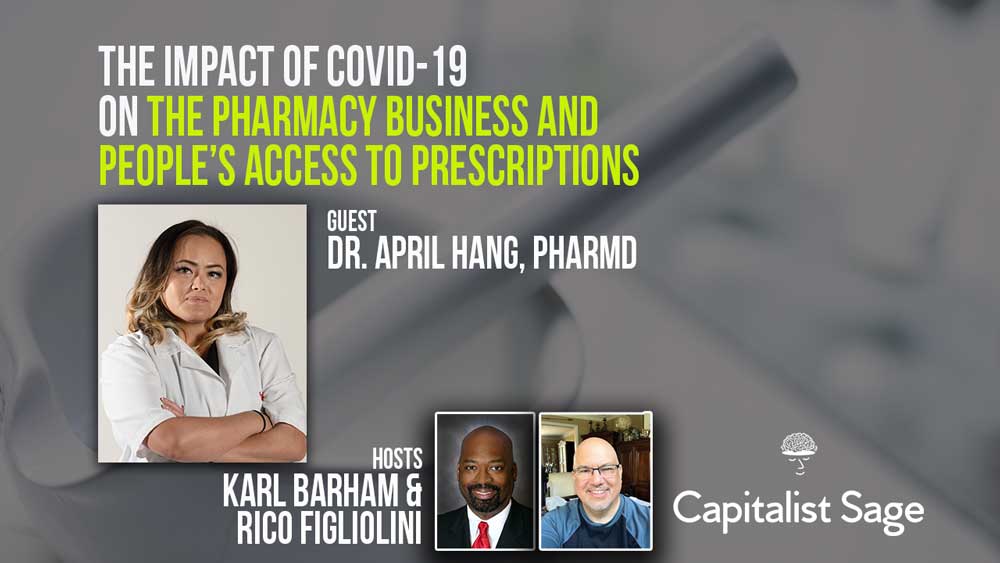
How did one pharmacy owner navigate COVID-19 and still provide access to medicine for their clients? Dr. April Hang, owner of Peachtree Pharmacy joins Karl Barham and Rico Figliolini on the Capitalist Sage.
Phone Number: (678) 691-9079
Address: 5270 Peachtree Parkway, Peachtree Corners, GA 30092
Website: https://www.peachtreerx.com/
Social Media: @PeachtreePharmacy
Timestamp, where is the podcast to find these topics:
[00:00:30] – Intro
[00:02:33] – About Dr. April Hang
[00:04:21] – What Makes Peachtree Pharmacy Different
[00:06:09] – Business Impact of COVID
[00:11:52] – Getting into the Pharmacy Business
[00:16:02] – Dealing with Insurance
[00:17:01] – The Future of Pharmacy
[00:27:53] – Balancing Business and Home Life
[00:28:37] – Closing
We (work) for local patients and that way, you know, we can manage and keep that close
April Hang
relationship as if they’re a family. Make sure everything’s okay.”
Podcast transcript:
Karl: [00:00:30] Welcome to the Capitalist Sage Podcast. We’re here to bring you advice and
tips from seasoned pros and experts to help you improve your business. I’m Karl Barham with
Transworld Business Advisors and my cohost is Rico Figliolini with Mighty Rockets Digital
Marketing and he is the publisher of Peachtree Corners Magazine. Hey Rico.
Rico: [00:00:47] Hey Karl, great to be here. We might as well jump right into it and I’ll tell you
about our lead sponsor for the show, for the family of podcasts. And that lead sponsor is
Hargray Fiber. They are a large Southeast company involved in fiber optic cable, internet
connectivity. Don’t think of the cable guy because they’re not that. They’re a company that’s
right in the communities that they serve and providing variety of services, including that
connectivity to your team that’s out in the field teleworking. They provide it whether you’re a
small business or you’re an enterprise sized business. And they provide tools like smart office
that can keep your team working, both whether they’re in office or they’re out there at home,
wherever they are working for you and getting sales done and getting work done. So check
them out HargrayFiber.com or Hargray.com/Business, and find out how you can get your
thousand dollar gift card, visa gift card from them once you get involved with the company. So
we want to thank them for being our sponsor.
Karl: [00:01:51] It’s funny how so many people are operating from home, learning from home.
And so having great internet and fiber optics is super critical. So thank you for Hargray Fiber for
supporting us. Today I am honored to have Dr. April Hang who is the owner of Peachtree
Pharmacy right here in Peachtree Corners and Gwinnett County, Georgia. We’re gonna
continue on our series, talking with small business owners about navigating through 2020, the
pandemic and all the things that have been happening in our community. Dr. Hang, how are you
doing today?
Dr. Hang: [00:02:27] I’m good. Thank you for having me on the show. I appreciate and feel
honored to be here.
Karl: [00:02:33] Well, I’m just happy to have you. And the fact that you’re in the medical health
field of operating a business here is really important considering what this year has been like.
Why don’t you start off by introducing, tell us a little bit about yourself and why you got into
pharmacy career.
Dr. Hang: [00:02:52] Well, I worked at CVS as a high school student. And I saw the pharmacist
and you know, it intrigued me to see these crazy names and what they treat. So I just kept
wanting to learn more. Then I got into pharmacy school at Virginia Commonwealth University
and graduated in 2002. We moved to Atlanta in 2009, when my second child was born and I
continued working for CVS and when I was pregnant with my third child in 2011, that’s when I
said, okay, I’m just going to open my own business because I’m just tired of all the red tape.
Karl: [00:03:37] I could imagine so many people go through that same journey in opening their
business. What made you choose this area to open it and what do you find, what do you find
that you like most about being your own business owner?
Dr. Hang: [00:03:50] I actually got into business so I can have more time for the kids and more
flexibility. So I wanted to be able to have a stable income and have the flexibility to be there for
the kids. So it’s, you know, I knew initially it was going to be more time consuming, but then, you
know, as time passes it’s, you know, it’s a lot better now.
Karl: [00:04:12] Yeah, no, I appreciate that. Are your kids here locally? How many kids do you
have?
Dr. Hang: [00:04:18] I have three children.
Karl: [00:04:21] Very good. Well, it’s so cool to be part of the community that you’re in. So you’re
operating you live in the community as part of that. Often people aren’t as familiar with some of
the independent pharmacy. I wonder if you could share with us some of the things that make
your pharmacies different than some of the chains like CVS, Walgreens and others.
Dr. Hang: [00:04:42] We compound at Peachtree Pharmacy, which is the biggest difference,
which is making customized medications for you or your pets or animals that you have. A lot of
the compounding we do right now is hormone replacement therapy and vet meds. So that’s one
main difference. We also do blister packaging, which I’m sure you guys have heard that Pillpack
was bought by Amazon and they’re trying to do blister packaging. We do that for local patients
and that way, you know, we can manage and keep that close relationship as if they’re a family.
Make sure everything’s okay, put in the right time position of their blister packs. So I don’t know
if you’re familiar with what I’m talking about.
Karl: [00:05:30] No, I am a little bit, but it’d be interesting. Have you seen more need recently for
being able to provide that more customized service to your customers?
Dr. Hang: [00:05:45] It really depends on where they’re living. If they’re in a personal care home,
then they, it’s mandatory that they get blister packaging. If you’re still living at home, it’s a
personal choice to have that convenience. So you’re not filling your medicine tray yourself. So
that’s an advantage that we have.
Karl: [00:06:09] Excellent. Well, I’m curious to ask you a little bit about this year and when the
news of the pandemic started coming out. When did you first hear about it? And did you think it
was going to have an impact on your business initially?
Dr. Hang: [00:06:27] I actually did have an impact as far as PPP goes at the beginning. We had
a program where it would upload things onto Google saying we had certain things like M95
masks. So we had a lot of questions about M95 masks and, you know, hand sanitizers and
things like that initially. We also have increased deliveries now since the COVID and then
patients are asking me to go outside and give them their flu shots in their cars so they don’t
have to come in and interact.
Karl: [00:07:07] So, since this all started, where did your, probably your physical center in the
central service, did you close down at any point during?
Dr. Hang: [00:07:17] We did not. We just put procedures in place. Started requiring masks, just
following the CDC guidelines. There were people that, you know, embraced it and there are, of
course, people that are not embracing it or they’re against wearing masks.
Karl: [00:07:33] So now that it’s kind of normalized to some degree, if you want to call it that, are
there changes you’ve made in your business that because of this, that you’ve implemented,
that’s had an impact either on your employees or your customers?
Dr. Hang: [00:07:51] I don’t really feel like that it’s been impacted much. I mean, we did, like I
said, put up the plexiglass and made social distancing and one entrance and one exit. But as far
as the business goes, it’s been pretty stable. You know, depending on what’s coming out in the
news about COVID, sometimes they would say something about azithromycin so then all of a
sudden there’ll be a back order of that because it gets in the news or Plaquenil. You know, just
certain things, whatever the news says and all the physicians, they try to write for themselves,
you know, write for their families.
Rico: [00:08:40] As far as supply chain goes, were you finding yourself in need of certain
medicines or in short supply of certain things besides the masks and stuff like that.
Dr. Hang: [00:08:51] I know there was a shortage on Plaquenil for a while and azithromycin
because that’s the main two things they’re using to treat in the hospitals. But I think it’s
normalized now so we can compound it. I do have the powder where we can actually make the
Plaquenil in capsules.
Karl: [00:09:13] It’s going to ask for those, what are those used for? What are the treatments
for?
Dr. Hang: [00:09:18] Azithromycin is an antibiotic. And then the Plaquenil is for like auto immune
usually like lupus. And this type of inflammation, auto immune diseases.
Rico: [00:09:33] So most medications, most prescriptions that have been coming to you, though,
you’ve been able to fill and all that? Pain medications, other things along those lines.
Dr. Hang: [00:09:43] Right, right. Yes.
Karl: [00:09:46] So I’m curious as you follow what’s happening with vaccines and some of the
treatments and therapies coming out, how do you prepare your pharmacy for an anticipated
demand when different drugs are, you know, getting approved or being, how do you manage
that process? What information and sources do you use to know what you need to have in
stock?
Dr. Hang: [00:10:12] We just follow the CDC guidelines. So whatever comes out, we try to follow
that. As far as like sources of medications or vaccines, everything is pending, so there’s no
nothing really credible out there. So I can’t really comment on it.
Karl: [00:10:30] It got it. Testing. Do you get involved with the testing that they’ve been talking
about?
Dr. Hang: [00:10:36] We do not test at the pharmacy. There’s a little bit of fear with the staff, so
we don’t test. You know, they have small babies and families or their parents live with them. So,
you know, they have their, their personal consent, so I don’t enforce it. But I just make sure they
let the patients know where they can go and get access. I know that, you know, I have a contact
that can come out. They have a mobile bus and they’ll do both the nasal swab and the serology
test. And the difference is one tells you, you have it. And one tells you, if you had it.
Rico: [00:11:17] So antibodies you’re talking about or is that something else?
Dr. Hang: [00:11:19] Right. Correct.
Rico: [00:11:21] And there’s a place that does that here in Peachtree Corners even?
Dr. Hang: [00:11:25] Well, I can, I mean, I’m trying to get them to come out on, the mobile bus.
It’s actually with Dr. Heavenly Kimes and her husband, Dr. Damon Kimes. So, and yeah, they
are local and they’re reality TV people as well.
Rico: [00:11:44] We are in the reality show ourselves, right.
Karl: [00:11:52] This whole year feels like it’s been part of a reality show. For young people out
there that are thinking about businesses and careers to go with, what are some of the reasons
people might go into pharmacy, either owning or becoming a pharmacist?
Dr. Hang: [00:12:10] There’s so many different parts to the industry that people don’t know
about. There’s working for pharmacy manufacturers and you can be a medical science liaison
between, you know, the public or the hospitals and the pharmaceutical company. There’s PBMs,
pharmacy benefit management organizations that handle your insurance and tell you what
you’re going to pay for or not pay for. You can work for those companies. You can work for
wholesalers as pharmacists. The hospital, obviously, different areas of the hospital. And then
there’s something called closed door pharmacy, where they deam a list of packaging just for
senior facilities. There’s a lot of different avenues.
Karl: [00:12:56] What’s a good way for folks to get started if they wanted. If I was a young
person or if you were advising younger folks, high school, college, what are some things they
can do to start getting experience, to see if it’s a right fit for them?
Dr. Hang: [00:13:09] I know personally for me, we have students come in and ask to volunteer,
but there are some state regulations where you have to be minimum age 18 to actually be in the
pharmacy. You have to register with the state just to be a pharmacy technician. And once
you’re registered, then you can come behind the counter and kind of shadow and learn. You
know, I would just recommend finding a local independent pharmacy that would take, you know,
take you as a student or as a shadow.
Karl: [00:13:44] How was the prospect in the industry? Is there a shortage? Is there excess?
Trying to find people, has it been difficult?
Dr. Hang: [00:13:54] It’s actually excess in pharmacists at this time. So, you know, jobs are a
little bit harder to find. You know, people are graduating and then the salaries are going down
because of the abundance of pharmacies schools letting out students.
Karl: [00:14:11] What do you think drove that? Is driving that?
Dr. Hang: [00:14:15] When I went to pharmacy school, there was a shortage. So as time went
on, more schools opened up and you know, they started producing more students. And now it’s
just an overabundance of pharmacists.
Rico: [00:14:31] Do you think that, if someone wants to get into the business, right? The
pharmacy business, it’s intensive, I’m sure, investment to get into it. Besides you need someone
that’s licensed to do it.
Dr. Hang: [00:14:43] Right.
Rico: [00:14:44] Does it have to be owner licensed to be able to get into this business?
Dr. Hang: [00:14:48] No. You don’t have to be a pharmacist to be an owner of a pharmacy.
Rico: [00:14:54] Okay. And you’ve bee, I mean, Peachtree Pharmacy has been around for how
long has it been now?
Dr. Hang: [00:15:00] Six years now, since I opened the store.
Rico: [00:15:03] Remember we used to go to CVS and there was some issues about getting
how CVS handles certain types of medications and inventory. Unlike retail, they do not track
their inventory and they can’t even let you know they have certain things unless you come into
the store to ask them. So this is one reason we decided to come to Peachtree Pharmacy
because, it’s just we felt that we were talking to someone closer. More assistant. And it was just
a better experience. No drive-through, but that’s okay. You have to be aggravated with…
Dr. Hang: [00:15:40] Well, we come outside. Even though we don’t have a drive through, I’ve
been outside to bring people their prescriptions.
Rico: [00:15:49] And you guys deliver too.
Dr. Hang: [00:15:50] Yes. If it’s a parent and your child is sleeping in the back they’ll say, bring
my medicine outside. Like of course, no problem. So yeah.
Karl: [00:16:02] Well, what’s something about the business of pharmacy, that most people
wouldn’t know, realize about it. Is there anything that could make it surprising to folks?
Dr. Hang: [00:16:13] I think that the amount of time we actually spend on the phone with the
insurances, trying to get you your medicine is the most challenging thing. Just because a
physician writes for something doesn’t mean your insurance is going to pay for it. So then that
becomes an issue. It could be two, three days before you get your meditation. You’re just
coming out of the hospital and you might rebound and go back into the hospital so you had your
medication? So there’s, it’s just insurance is making everybody’s life hell.
Rico: [00:16:45] Yeah, and some of them will cover the generic, but not the brand right? And
some people want the brand versus the generic because they feel maybe the brand works
better, right?
Dr. Hang: [00:16:56] Right. But you’re not allowed to have that choice with insurances.
Karl: [00:17:01] So you managed to keep track. So now that 2020 is kind of continuing, I’m
curious about looking forward to the future. Do you see things that you can do differently or, as
you go into the future with your business?
Dr. Hang: [00:17:19] I think I learned, since a couple of years ago, I had a senior coming in my
store, this is somebody’s grandmother, somebody’s aunt, sister, cousin, you know. And she
handed me a prescription for marijuana. And it said a ratio of 1 to 30. And it’s one dropper at
that time for dementia. And I didn’t know how to help her. And I felt so bad when I can’t help
someone, I feel really awful. So, I got on the phone. Put her son on the phone who was in
California and he was really upset and he’s like, where can I send her to get this? She really
needs, it helps her stay at home by herself, it helps her with her daily activities or activities of
daily living and things like that. And I was like, all I could do was apologize and say I don’t have
an answer for you because we’re in the Bible belt. You’re out in California. It’s different.
Karl: [00:18:27] So, what is, are you able to, provide CBD or medical marijuana here in
Georgia?
Dr. Hang: [00:18:35] Medical marijuana is not accessible. CBD is very accessible anywhere and
you can get it from gas stations, to the smoke shops and, Peachtree pharmacy. You have to
educate yourself. You have to understand what the effects are. It can interact with your
medications, you know. Depending on how much you use, there’s the risk of having a positive
drug test. So it’s just, you have to be able to educate your patients on the proper use.
Karl: [00:19:14] Where would folks would go to learn more about that? Like, let’s get educated
on some of the benefits. What treatments for that? Is that a conversation with the physician?
Are there online sources for information?
Dr. Hang: [00:19:28] Honestly, I am on this thing right now where I want to educate other health
care professionals about it. Because most of them don’t really know. I mean, there’s so much
out there. There’s a DNA test you can do to let you know what ratio is best for what condition.
So they have that for, you know, general, big pharma medications, but they also have it for the
CBD and PAC as well.
Karl: [00:19:55] So does the doctor have to write a script for that or is that something people can
come in and get without a prescription from a doctor?
Dr. Hang: [00:20:05] They can come in and get it at Peachtree pharmacy. It’s just a, it’s actually
a cheek swab and it’s from a company called Endocanna out in California, Los Angeles. And so,
kind of met them at a conference and kind of partnered up. Because I wanted to be able to offer
a kind of service for all the patients not just big pharma meds. But offer, you know, all the
benefits of CBD that’s emerging on market right now.
Rico: [00:20:36] And April, you’ve been involved with some of the politicians in the area too,
right. Lobbying, but so bunch of legislative work. So who have you been working with and how
is that going?
Dr. Hang: [00:20:49] I actually am not officially a lobbyist. I’m officially a constituent. So when I
go there, I’m going for me personally, as a pharmacist and not representing any company. But
you know, the intentions I have to help people. So when they were talking about access to
medical marijuana, I did speak and say, you know, you have to have pharmacists involved,
make sure that they review everybody’s meds because there are drug interactions. And, you
know, they don’t teach you that in pharmacy school. All the knowledge I have, it’s stuff I’ve read
or just learned about.
Rico: [00:21:28] Really? They don’t teach you about it?
Dr. Hang: [00:21:31] They don’t teach you about Marijuana in pharmacy school.
Karl: [00:21:37] Not in the classroom. So what types of treatments or things that people are
coming in for CBD and similar?
Dr. Hang: [00:21:53] We have like this CBD oil. I don’t know if you can see.
Rico: [00:21:59] Is that peach?
Dr. Hang: [00:22:01] Yes. It’s peach relief CBD oil that we sell. We have capsules, we have
topicals. We have dog treats, you know. And soon to come we’ll have get goodies products in
the store.
Karl: [00:22:15] What types of conditions does it help with? What types of patients would find
this helpful?
Dr. Hang: [00:22:22] Honestly, any patient. With headaches, depression, anxiety, sleep
deprivation, you know, anything.
Rico: [00:22:33] And you said you do that, you say you do that DNA swab, and that’s supposed
to help with that ratio of medicine that you’re able to apply right?
Dr. Hang: [00:22:46] Right. So in a perfect world where I see the future going is that, you’ll have
this DNA tests and then you have to have more customized medication that works for you
based of your genetics. So you know what your body can process and not process. Because if
you don’t have the enzymes to get rid of the drug in your body, it is the beneficial test. But this
DNA tests are very expensive.
Rico: [00:23:17] Yeah. I don’t think most people realize that. Yeah, most people, if I’m not
incorrect, don’t realize that medicine even antibiotics or mainstream medicine that people hear
about only work on a percentage of people. They’re not, you know, people assume that they’re a
hundred percent effective, but no medicine is that way. And they’re usually, probably only 80%
effective.
Dr. Hang: [00:23:38] Right, right. And your body can only absorb so much. So like on CBD oil, if
you take or consume any kind of CBD product, you only absorb 6%. And I don’t know where I
read that, but that number is in my head.
Karl: [00:23:56] Does it matter, like, you know, proportionate to the size of the person or is it just
their genetics in there.
Dr. Hang: [00:24:02] It’s their genetics, like you have in your body, what they call the
endocannabinoid system. And so that’s CB1 receptors and CB2 receptors. So CB1 receptors is
your central nervous system. And that’s where THC, that’s where the THC usually binds. And
that’s why you have the psychoactive effects. However, with the CB2 receptors, that’s more on
the peripheral, the body and the organs. So if you have some kind of inflammation, they’ll help
you and kind of get back to normal and get to homeostasis.
Karl: [00:24:38] Wow. Well I know there’s been a lot of different folks that are providing that. You
mentioned gas stations and so on and…
Dr. Hang: [00:24:47] Right.
Karl: [00:24:48] Do you know if they’re doing anything to kind of gain greater control because
there could be contamination. There could be, you don’t know what the source is, is some of the
risk that I’ve heard about. Can you tell me a little bit about some of the risk factors of procuring it
in the wrong place?
Dr. Hang: [00:25:06] Well, there’s a lot of mislabeling. I know like if you have a CBD product and
you’re not sure that it says what it says on the bottle, you can actually send it to Georgia
extracts and they’ll test it at UGA and Athens and let you know what’s inside.
Rico: [00:25:27] Because this is not prescribed or anything. There’s no FDA approvals, there’s
no Georgia State quality control of it?
Dr. Hang: [00:25:37] There is the farm bill and that’s just with the hemp flour. But I honestly
haven’t read the entire farm bill, so I couldn’t comment too much on. But I know it’s to help
regulate the actual growing agriculture, like keeping pesticides out of it.
Rico: [00:25:53] Right. Do you see, April, do you see whether, if marijuana becomes legal in the
state of Georgia, at least medicinally legal, if not recreationally legal, do you see that as
something that Peachtree Pharm would be selling? That, you know, alongside the CBD oil and
stuff?
Dr. Hang: [00:26:17] It’s actually in the bill HV324, and you know, when, when the state gets the
infrastructure set up, there’ll be sold at certain specific pharmacies and how they decide that will
happen after they set up the infrastructure for access.
Rico: [00:26:37] Well, so every pharmacy or just certain pharmacies?
Dr. Hang: [00:26:41] My understanding, it’s going to be certain pharmacies. They’re right now,
they just hired an executive director to create the infrastructure for oil. And so once that gets set
up and people start applying and they start growing, while they’re doing the cultivating, they’re
going to decide or the pharmacy is going to decide. Okay who, which pharmacies?
Karl: [00:27:10] I mean, if you look into the future, how big can that industry you think get? I see,
I hear a lot of different, you know, ideas around a widespread, people might use it for all
different applications. Have you thought about how big that could be and how it might impact
your business?
Dr. Hang: [00:27:33] Honestly, it would help people get off their medications. So I mean, if
people would learn a little more about it, they can probably reduce their medications. But they
have to make sure, you know, the doctor knows. The doctor is educated or the pharmacist is
educated or the nurse.
Karl: [00:27:53] Well, I know as we look into the near future, people are being impacted because
kids being home and everything else. How are you balancing all of the demands on you?
Business, your family, have you figured out things to help you manage through this strange
year?
Dr. Hang: [00:28:13] I mean, I, you know, I’m lucky and I have a supportive family. I have my
parents living with me and then my husband is very supportive. So, you know, I’ve been lucky.
I’ve been able to, you know, go back and forth and stay home if I need to. So I’m just home
more. I miss going to the movies.
Karl: [00:28:37] Yeah, I think we all do, but when I hear that they’re starting to open up in some
locations and getting back. But between that, sports being thrown off schedule, I don’t know
what part of the year we’re in sometimes based on all of that. Well, I want to thank you so much
for joining and talking a little bit about, you know, the impacts of the pandemic on your business.
Help educate us a little bit about CBD oil and the alternatives that are available. More than
anything, I consider you and your staff are frontline, first responders. People needed help and
through this year, they needed to get their medications and it’s small business owners like
yourself that I’ve done just a great job of keeping people well as best they can. So if you haven’t
been thought, thank you from one of your clients. I like to do that for that. Well, how would folks
reach out? Why don’t you tell us your address and how they can find you social media phone
number? Just if you want to reach out and learn more.
Dr. Hang: [00:29:55] Our phone number is (678) 691-9079. Our website is
www.PeachTreeRX.com. We’re also on Facebook, under @PeachtreePharmacy, and also
Instagram.
Karl: [00:30:13] And what’s your address and where would we find you here in Peachtree
Corners?
Dr. Hang: [00:30:18] It’s 5270 Peachtree Parkway where the new Lidl that just opened up in that
shopping center.
Karl: [00:30:26] Well, absolutely while we definitely encourage folks to take a visit to Dr. Hang
and her staff, and, you know, just want to thank you again for being on our show today.
Dr. Hang: [00:30:36] Thank you, I appreciate it.
Karl: [00:30:38] You’re welcome and stay safe please. Well, I’d like to just segue into what we
have coming up. We’ve got more of discussions as we talk about the end of 2020. We’re going
to have some podcasts talking about, you know, what do you do now as you’re getting to the
end of the year to grow your business. And so stay tuned, follow us on all of our different
channels. I’m Karl Barham with Transworld Business Advisors of Atlanta Peachtree. Both myself
and the rest of the folks on my team, we help talk to business owners, help them figure out how
to improve and grow their business, whether it’s through acquisition or for those that are ready
to do something else, how to exit their business. Feel free to reach out to us online
www.TWorld.com/AtlantaPeachtree, or you can email me at KBarham@TWorld.com. Rico, why
don’t you tell us about what you have coming up?
Rico: [00:31:41] Sure. We’re working on the next issue of Peachtree Corners magazine. And
we’ve got a strong set of stories, hopefully coming in there. We’re actually doing a pet and their
people issue as well. So we have a giveaway that just started running today and 3 winners,
$700 in prizes. Submit a picture of yourself and your pet, and you’ll probably get into the
Peachtree Corners Magazines next pull out in the next issue. Plus, we’re doing the story about
backyard retreats, you know, everyone’s home there during COVID-19. So if you have a fire pit,
you have a beautiful backyard, we’re checking out five of them in Peachtree Corners and we’ll
share where those are and what they look like. And we’re asking 50 people almost, we’re
asking everyone actually and hopefully we’ll get 50 of them, about what they’re thankful for this
year. Besides, you know, we’re thankful for family and friends, for sure. But what also are we
thankful for during these times. So we want to find that out. Remember, this is the October,
November issue. So we’re doing Halloween and Thanksgiving. Yeah, so that’ll be fun. So we’re
working on that. So if you guys want to check out the last issue, which April was part of that last
issue, she was one of several people we profiled when it came to diversity in our community.
You can find that online at LivingInPeachtreeCorners.com. Follow us on
@PeachtreeCornersLife, the Facebook page, where we’re doing these podcasts from. Our
YouTube channel you should subscribe to that as well, because this way you can get alerts
when we go live there and when there’s more videos posted there as well. And you know, I do
work with a lot of different companies handling their social media, video production, whether it’s
product videos or other types of production work, and obviously producing podcasts as well. So
you can check me out at MightyRockets.com for that, or find me on LinkedIn or Google my
name because there aren’t that many people called Rico Figliolini. You can find me anywhere.
Karl: [00:33:39] Well, thank you for all that you do. And please do check out the magazine
online. There might be some still out there to pickup if you haven’t and just keep up with what’s
going on in the community and get to meet and learn the folks that make up your community.
Thank you again, Dr. Hang for joining us today. Everyone have a great day.
Rico: [00:34:01] Thank you.
Related

Business
Music Matters Productions Expands Peachtree Corners Headquarters
Published
2 weeks agoon
May 21, 2025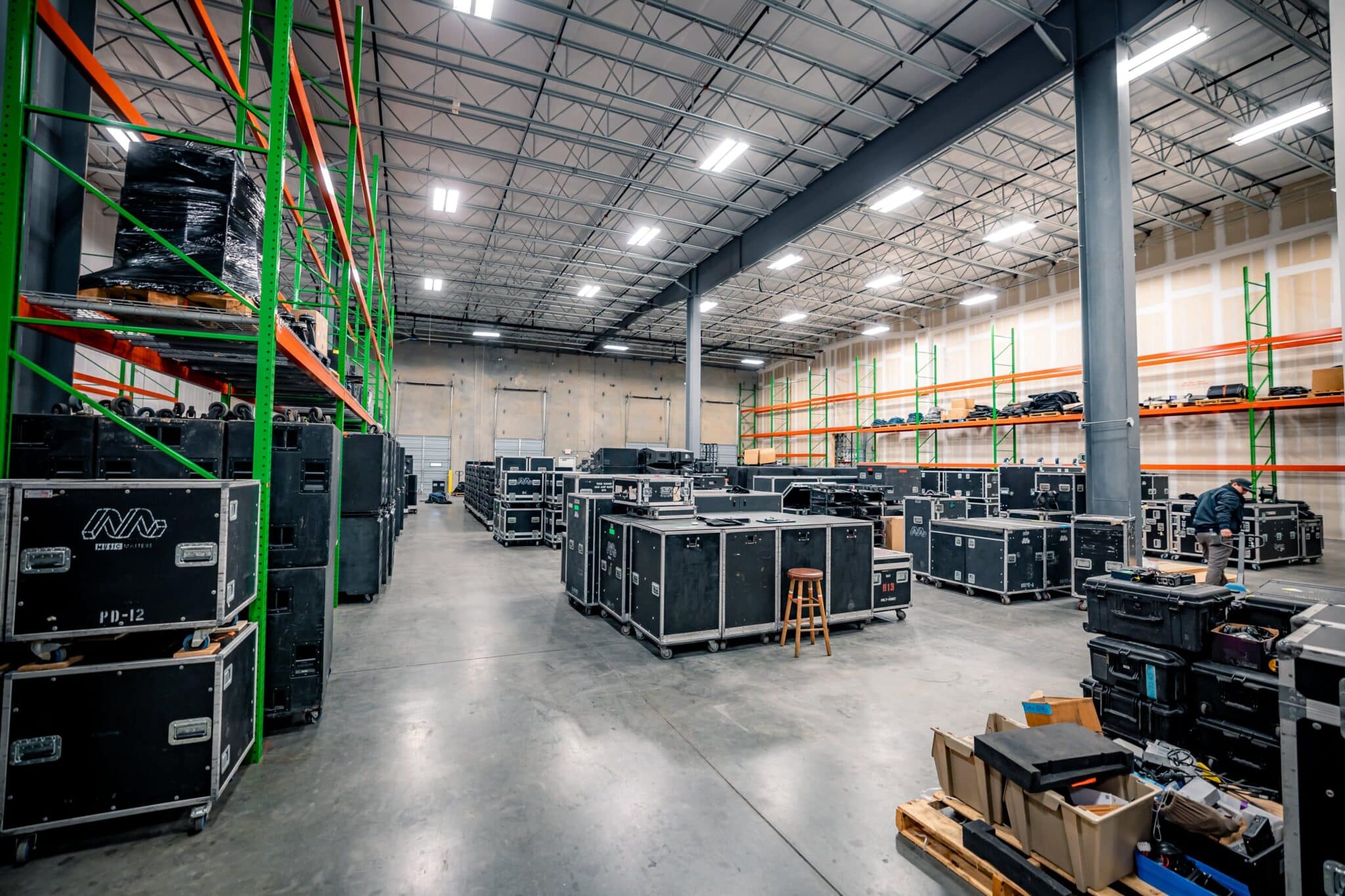
Company adds 20,000 square feet to meet growing demand
Music Matters Productions (MMP), a premier provider of audio, lighting, video, staging and rigging solutions, has expanded its metro Atlanta headquarters, increasing the total warehouse footprint from 40,000 to 60,000 square feet.
In addition, MMP has opened a second 10,000-square-foot building directly across the street to house its growing corporate production division.
The expansion comes in response to increased demand across touring, festival and corporate markets, as well as the continued growth of MMP’s high-end gear inventory. With a fully dedicated shop for each department, including audio, lighting, video, rigging and staging, the new layout provides more space for show prep, pre-rigging and crew coordination, allowing for even more efficient load-ins and streamlined execution.
New features
The rigging department now features a new mobile motor hoist test stand, allowing for in-house motor certification, a service that’s now available to external clients in the production community.
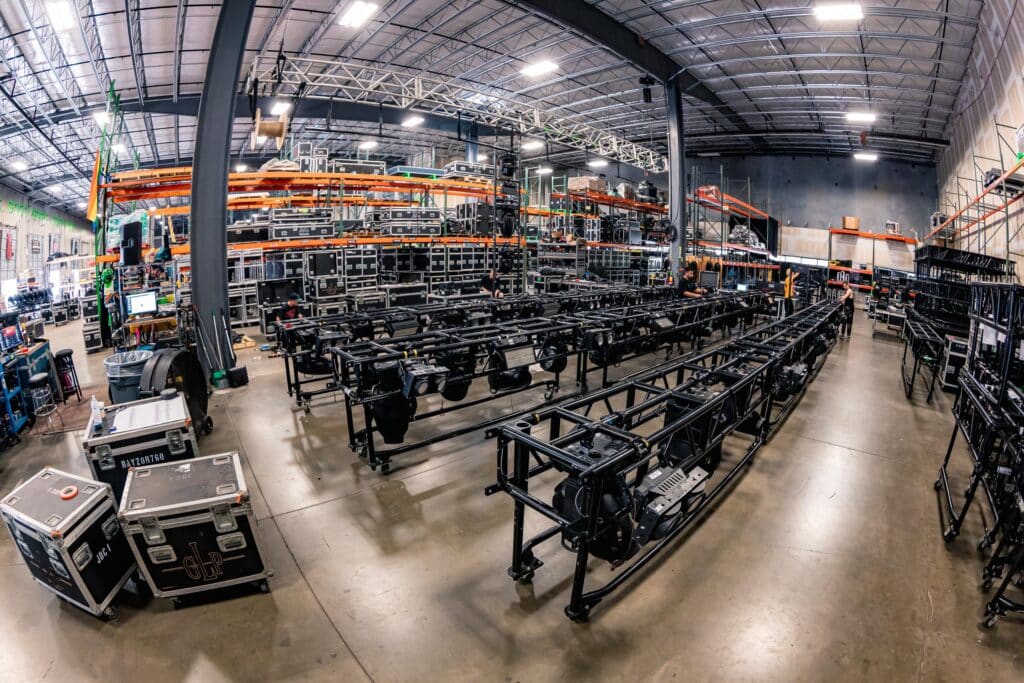
Five new truck bays were added in the process, as well, bringing the total number of bays to 17 — an important upgrade for MMP’s fleet and the increasing number of shows moving through the warehouse each week.
“This growth is a direct reflection of the work our team puts in and the trust our clients place in us,” said Aaron Soriero, owner of Music Matters Productions. “We didn’t expand for the sake of being bigger, we expanded because we needed the space to do the job right. More room means tighter prep, faster turns and better support for our clients.”
Expanding operations
The expanded warehouse and building across the street include additional offices, mixed-use areas and a dedicated repairs department, giving the team more capacity to prep, collaborate, QC and scale for increasingly complex events — both corporate and entertainment.
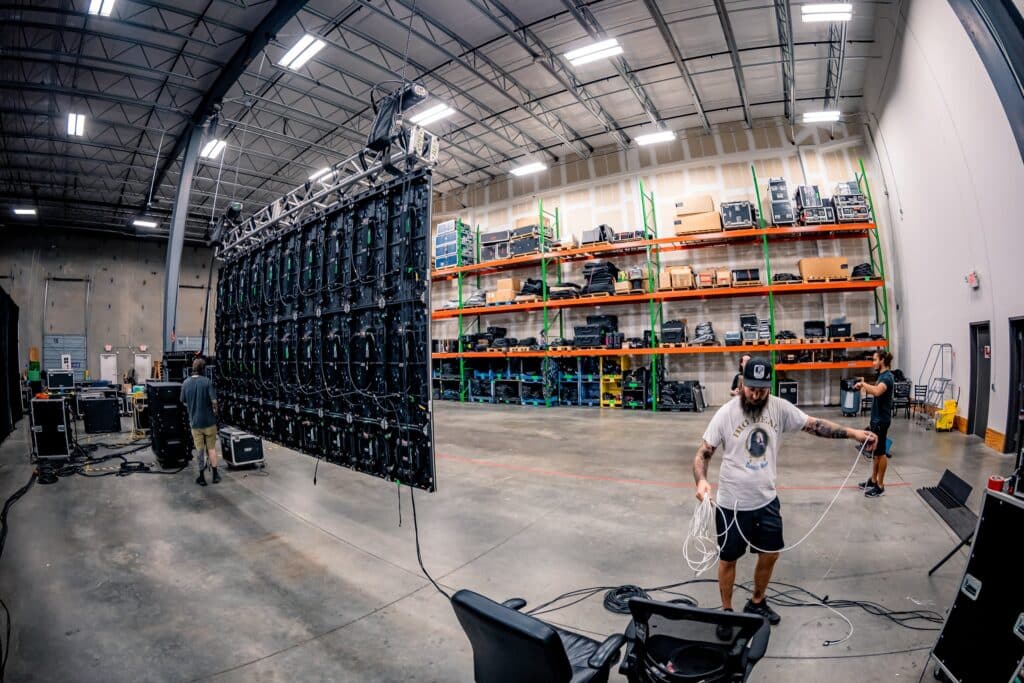
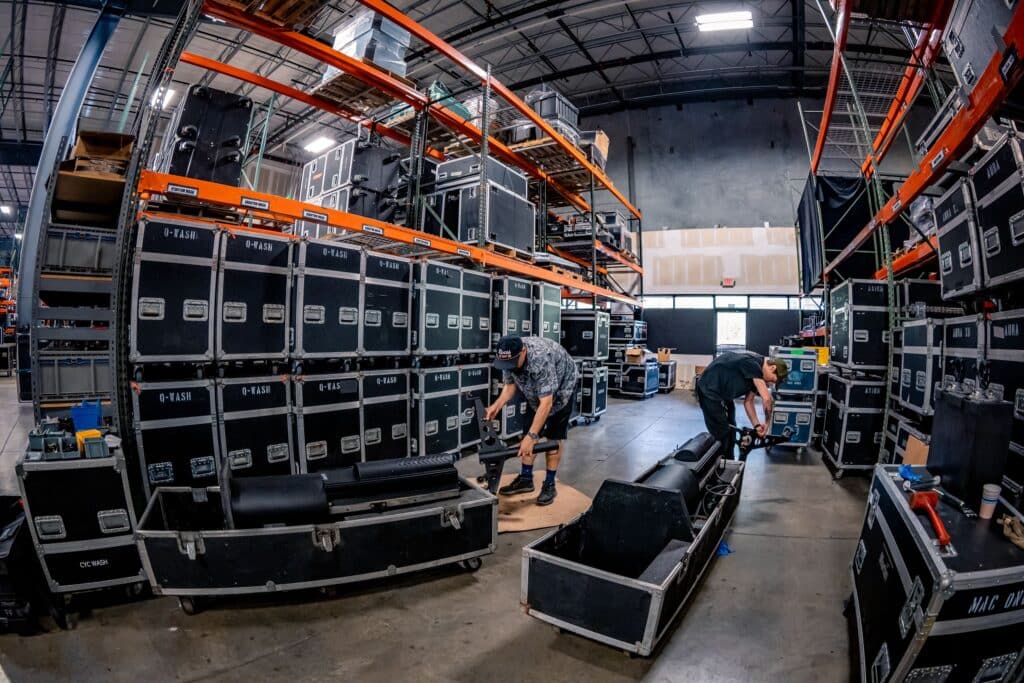
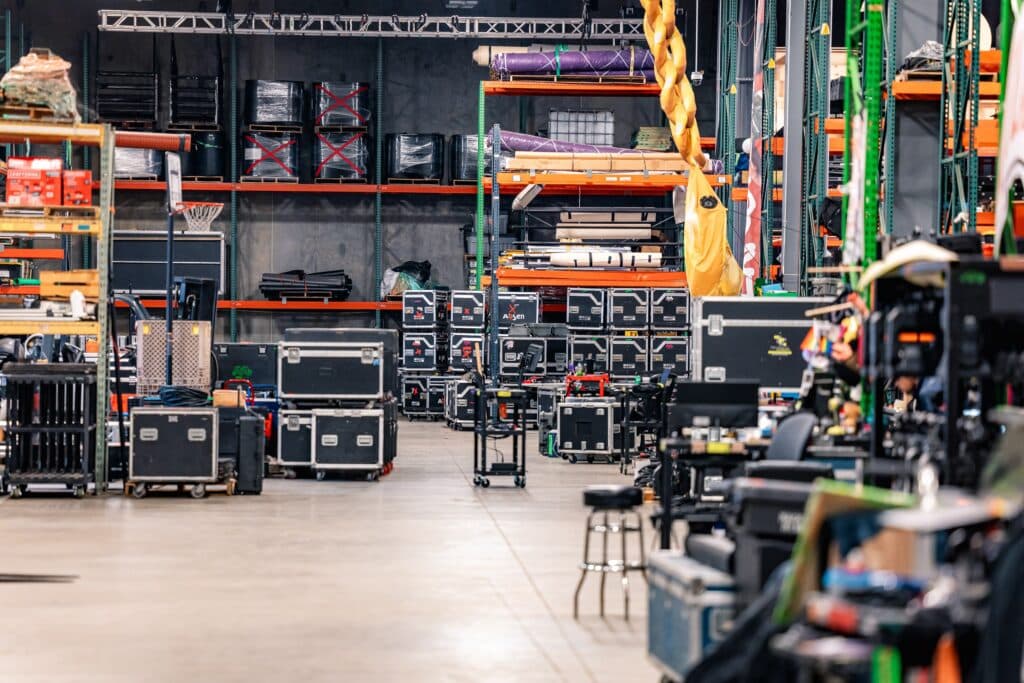
With a reputation built on reliable gear, experienced crews and an enhanced client experience, MMP continues to solidify its role as a go-to production partner for events of every size and setting — whether it’s a beachside festival, a stadium tour, brand activation or a high-stakes corporate show.
About Music Matters Productions
Music Matters Productions is a full-service live event production company based in Peachtree Corners, Georgia, providing industry-leading audio, lighting, video, rigging and staging solutions for tours, festivals, brand activations and corporate events across the country.
Known for its high-end inventory, seasoned crew and deep dedication to doing the job right, MMP supports hundreds of productions each year and is trusted by clients nationwide.
For more information, visit mmp-atl.com.
Related
Business
From Boardrooms to the Himalayas: Vandana’s Journey to Purpose and Growing with Intention [Podcast]
Published
2 weeks agoon
May 19, 2025
How one family blends operational clarity, conscious leadership, and community-driven values to grow their business — together.
In this episode of UrbanEbb, host Rico Figliolini chats with Vandana Aggarwal, VP of Operations at Aggarwal Real Estate, about the winding road from global consulting to family-run commercial real estate in Norcross, Georgia. With honesty, warmth and insight, V shares how she went from working 80-hour weeks in corporate strategy to rediscovering clarity in the mountains of India — ultimately helping transform her family’s business into a community-driven real estate firm managing over 50 shopping centers.
The conversation weaves together themes of leadership, legacy, operational excellence and the transformative power of both AI and yoga. It’s a story about clarity, courage and conscious growth — both in business and in life. This is another episode you won’t want to miss.
Episode Highlights
- Why Vandana left a high-powered consulting career to join her family business
- How hiking Kilimanjaro and studying yoga in the Himalayas changed her leadership mindset
- The operational overhaul she brought to Aggarwal Real Estate to support growth
- What it’s like working side-by-side with your dad, siblings, and 700+ tenants
- How the company rebranded with intention and built a mission around “building communities as a community”
- Where AI is reshaping real estate—from lease drafting to property management—and where it still can’t compete with people
- Leadership succession planning with siblings at the helm
- The importance of clarity, calm, and conscious growth in both business and life



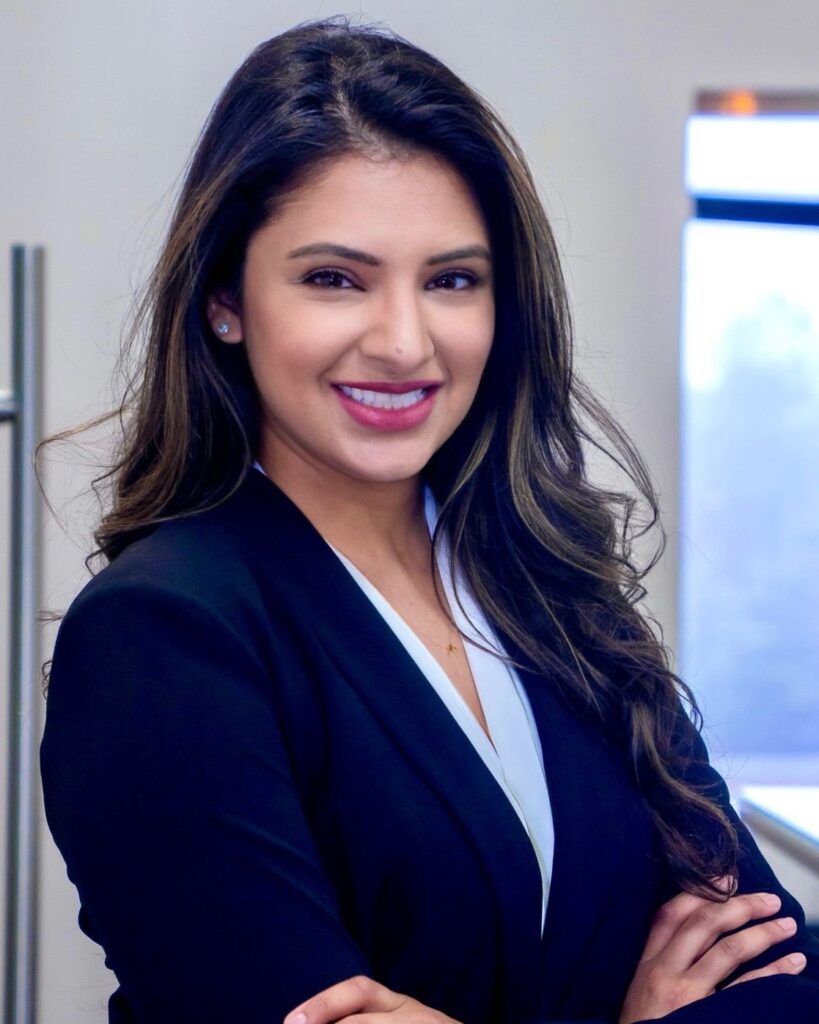




About Vandana Aggarwal
Vandana Aggarwal is the Vice President of Operations at Aggarwal Real Estate, her family’s commercial real estate investment and management firm. She brings a unique blend of strategic insight and operational excellence, shaped by her early career as a consultant at A.T. Kearney, where she advised Fortune 100 to 500 companies. A graduate of Georgia Tech, she also took a transformative detour from the corporate world to spend a year in India teaching yoga—an experience that continues to influence her leadership style today. At the core of her work is a deep commitment to family and a passion for building strong, connected communities.
Timestamp:
00:00:00 – Introduction and sponsors: Vox Pop Uli & EV Remodeling
00:03:12 – From Georgia Tech to global consulting
00:04:23 – Leading strategy for Fortune 500 companies
00:06:11 – The role of vision alignment at the C-suite
00:08:01 – Sabbatical becomes family business overhaul
00:09:35 – Bringing operational excellence to a growing real estate firm
00:12:02 – A year of yoga, nature, and healing in India
00:17:03 – Hiking Kilimanjaro, testing limits, and expanding self-trust
00:18:52 – Navigating family dynamics inside a business
00:21:56 – Planning for leadership transition: siblings, strategy, succession
00:24:06 – Rebranding the business: from American Management to Aggarwal Real Estate
00:26:33 – Where AI fits (and doesn’t) in real estate operations
00:30:04 – Legal, leasing, HR, and marketing efficiency with tech
00:31:01 – Community-focused retail and experiential shopping centers
00:32:00 – Reflections on AI, journalism, and digital trust
00:32:57 – Closing thoughts
Podcast Transcript
00:00:00 – Rico Figliolini
Hi, everyone. This is Rico Figliolini, host of UrbanEbb. This podcast comes out of the city of Peachtree Corners, and we have a special guest today. And if I don’t mess up the name, it’s Vandana Aggarwal.
00:00:15 – Vandana Aggarwal
Absolutely. You can call me V, Rico.
00:00:15 – Rico Figliolini
I’m going to call you V, trust me. And I’m Rico Figliolini, so a bit of a long name there. But V is VP of Operations of Aggarwal Real Estate here, based in Peachtree Corners? No, Norcross.
00:00:30 – Vandana Aggarwal
In Norcross, yeah. Norcross, Georgia.
00:00:32 – Rico Figliolini
Yeah, yeah. Just off 85, and?
00:00:34 – Vandana Aggarwal
Jimmy Carter.
00:00:35 – Rico Figliolini
And Jimmy Carter.
00:00:36 – Vandana Aggarwal
We’re completing each other’s sentences already.
00:00:39 – Rico Figliolini
But where are we doing this? We’re doing this from one of our great sponsors, one of our two great sponsors, Vox Pop Uli. Was this tastefully obnoxious? Let me tell you, I asked them to do a corner cut for us, and this is perfect. So they have the Moxie logo and stuff. So they’re branding, right? Same way they can brand your stuff. They’ll put your logo on anything. They’ve done, I think, 6,000 vehicle wraps. They’ve done garments, obviously. They could do one-offs or they could do 1,000. They do trade show booths, wraps, everything. So anything you need a logo on, think of what object you want it on. They’ll figure it out for you. And if you’re doing, let’s say, 5,000 mailers and you want that database customized for each postcard, they could do that also. It’s called data. I forget what it’s called, but they can do that. They can work the data into the printing as well. So all customizable. Check them out, voxpopuli.com. Now, getting to something we were talking about, hands-on stuff, which is this also. This can’t just be done by machines, right? Although machines, you still need people. But EV Remodeling Inc., they are a remodeling company. They can do design to build. They can do whole house renovation. They can create your deck, your backyard gazebo. They can put a bathroom, kitchen, anything you want. EV Remodeling Inc. is owned by Eli and his family. Lives in Peachtree Corners. It’s based out of our city. They’ve done, I think, over 250 homes recently. So check them out, evremodelinginc.com. And I want to thank both of them for being great sponsors of ours. So, it’s always a long stretch doing that, but I’m glad to have you, V.
00:02:22 – Vandana Aggarwal
I’m happy to be here. Thank you for inviting me onto your podcast. Excited to chat with you.
00:02:25 – Rico Figliolini
Yeah, no, this is cool. Well, you know, I met you, where did I meet you at? I think it was the chamber.
00:02:30 – Vandana Aggarwal
Yeah, the Southwest Gwinnett Chamber event.
00:02:32 – Rico Figliolini
Yeah, and we were talking a bit, and I was like, damn, you know, I had my father owned a business, and he wanted his kids to be in it. None of us, none of us could go into that business. It’s a little difficult, different industry. It was a hard industry, plus my father was very patriarchal, very over-demanding. God bless him. He mellowed in age. But when you were telling me about your family, I mean, your father, your mother, your sister, your brother, and you, I mean, all in it. It’s amazing.
00:02:55 – Vandana Aggarwal
We’re all together. We’re the modern-day Brady Bunch.
00:03:03 – Rico Figliolini
I love it. Yes, that’s exactly it. But, let’s start a little bit. I mean, you were telling me, I mean, you came from a consulting world. You came where you were actually being paid a lot more than you’re being paid right now, actually.
00:03:12 – Vandana Aggarwal
I told my father he couldn’t afford me when he recruited me out. So I graduated from Georgia Tech in 2007. I actually did join his company right out of college for two years, learned a lot about the company. He actually had me go through a rotation in every department of the company to learn more about what we did, how we operated. And I think very quickly, it was also 2008-9 with a recession. But I was also very interested to learn how big companies operate. How can you take a small company at that time? We were much smaller than we are today and really understand how do you go from this, which is where everyone starts, right? As a new company to get to be one of the largest in the nation, in the world and see how they operate, how they grew it from, you know, a mom and pop business to this global enterprise. Consulting was a natural transition to learn about multiple companies, multiple industries. So transitioned into AT Kearney, which has now been rebranded as Kearney, and out of their Chicago office. So I was there for seven to eight years, almost eight years.
00:04:23 – Rico Figliolini
Entry-level position you got in?
00:04:24 – Vandana Aggarwal
Yeah, I went in as an analyst. The good thing with that experience was by the time I left, I was a senior manager with Kearney. I worked across 17 different companies in those eight years. So I got to experience how CPG companies, retail companies, transportation, IT, you name it, I’ve done it. In terms of the different types of industries I got to work with, worked with a lot of Fortune 100 to 500 companies at the C-suite level. So we were coming up with all kinds of strategy projects such as new market entries, mergers and acquisitions. A lot of what I ended up specializing in in those seven years was operational efficiency and growth strategy. So it was an amazing, I’m grateful for that learning experience, the you know the caliber of minds that you work with. You also get to experience what the C-suite looks like. How does the very top operate and then it goes from the top down right? So it is very much led at this very top leadership and you see how companies change in their culture the way they operate based on how the top is designed.
00:05:38 – Rico Figliolini
So did you see good and bad at the top?
00:05:41 – Vandana Aggarwal
Absolutely. And I’m not going to name names. But you learn a lot when you see how your CEO and your C-suite right below them, the culture they’re bringing into a company and their vision and their goals if they’re aligned, unaligned. Anyone that at the very top have different viewpoints of where the company has had it is where companies start to break apart, lose revenue, lose their you know people, which is very important.
00:06:11 – Rico Figliolini
Where did you see the pain point then? What was the common denominator I guess of those?
00:06:18 – Vandana Aggarwal
There’s no one common denominator, but if I had to kind of narrow in, it comes down to what is our five-year, ten-year trajectory? Where are we headed? As large companies grow, you’re not just in one industry. You’re not just doing retail shopping centers. You’re investing in all kinds of properties just to bring it back to our company. Similarly, a CPG company can make all kinds of products, so they have to decide what it is because you have to be concentrated on the right places. If you have a leadership team that is in alignment of what that ultimate goal is, right, then you have clear strategies and, you know, metrics you’re measuring your success against. So that was a big thing that I learned. Also just, you know, seeing how great leaders operate, right? Some of the best in the nation today, I got to be in the room with them and just to see how they lead is very important.
00:07:14 – Rico Figliolini
Did you see any family dynamics in any of those businesses?
00:07:20 – Vandana Aggarwal
No. You know, there may have been like a father-son duo, but when you’re looking at the very top, I won’t say it was like all in the family, right? You know, and it also becomes the size of a company, right? You know, when you get to an international scale, you’re not always blessed that every person in your family has the right skill set and experience to fill each role on that C-suite.
00:07:46 – Rico Figliolini
I’m just thinking Trump for some reason. Every kid has a job.
00:07:51 – Vandana Aggarwal
Every kid has a job.
00:07:52 – Vandana Aggarwal
You had the accent, right?
00:07:54 – Rico Figliolini
Pretty much, I guess. So after the C-suite or expansion, you traveled a lot too, I think, right?
00:08:01 – Vandana Aggarwal
I did, yeah. So after my seven, eight years in consulting, I was reaching 30. And Shiv, my father, came to me and he said, you know, you’re doing this for a lot of outside companies. Why don’t you help us grow and bring your expertise home? And I said, look, I’ll take a sabbatical. Let me assess the company. And after that period where I took a short sabbatical to come look at how we were operating, I said, I can give you three years. I said, you can’t afford me, but I’ll give you three years of my time. And I said, I think it’ll be the right, it was the right time in the company. We were investing very heavily. We were bringing in a lot of new square footage into the company, and we weren’t designed to manage it. So we as a company, as you know, we are the investors. We have an in-house management company, an in-house leasing company. So as we acquire new properties, our team does the management for those properties in-house. We don’t provide third-party services today. And we do the leasing in-house. But at that time, when he, you know Shiv started we had one or two and now we’re at 50 shopping centers plus and other investments that we have. And there’s a very different way you operate you know and how do you how does the CEO go from being an operator to where he’s overseeing it, but he’s not into the weeds right? So he has create a system for that to happen right? You have to have standard operating processes for your property managers, your accounting team, your marketing team.
00:09:35 – Rico Figliolini
And you quite didn’t have that before.
00:09:37 – Vandana Aggarwal
We didn’t, no. And, you know, and I think that’s why he wanted to bring me in is because my strength is operations and I love it. I love going into messy places and cleaning them up.
00:09:49 – Rico Figliolini
Is that what you did when you were a consultant?
00:09:51 – Vandana Aggarwal
A lot of what I was concentrating on at the end of my consulting career, yes. So I did a lot of operational efficiency work. So we’d go in, assess the way companies were designed. And we’d interview hundreds of team members to understand what their role is. You know, what are they responsible for? How are they delivering? What are they measuring for success? And then we’d redesign the way they did that based on, again, bottom line, what are your ultimate goals for the company?
00:10:21 – Rico Figliolini
So you had to understand that before you got to that point. And you’re not making the decisions, the C-level.
00:10:29 – Vandana Aggarwal
Present, right? And similarly even with Shiv, when I first joined, I said, look, this is how I think we need to redesign the company from a bottoms-up perspective based on ultimately our goal of growth, doubling, tripling in size over the next ten years. And I think this is where the father dynamic came in. I guess he trusted me. And he said, do it. He just said, do it. And it was beautiful because right when you’re with large companies, it’s a lot of time before you get. Those decisions made and that trust, right? And so it was great. And he said, yeah, just put it into place.
00:11:07 – Rico Figliolini
See, that’s a great dad, actually. Some dads would be like, I don’t know about that daughter or son or whatever.
00:11:16 – Vandana Aggarwal
It did take time, though, like to ultimately, he was in the operation so heavily. And, you know, until today, I’m still like, step up, step up. Like, I need you to not get into the weeds. Like I think at that time we had tenants calling him, maintenance guys calling him. Like every little and big problem would go through his cell phone. I said, you’re too smart and you’re such a good investor. This is not your skill set. You shouldn’t be managing this. You need to bring people on who are expertise in this area. And I said, you need to be focused on like the larger plan.
00:11:51 – Rico Figliolini
This way you can grow it better.
00:11:51 – Vandana Aggarwal
Which I think has been very successful over the last eight years I’ve been with him now.
00:11:57 – Rico Figliolini
So before you got to him, though, you were traveling a bit internationally as well?
00:12:02 – Vandana Aggarwal
Yeah, yeah. So this is an amazing year. I was very burnt out. By the time I left consulting, I was working 70 to 80-hour weeks, traveling Monday through Thursday, if not more than that, of the week. So I told Shiv, I was like, I’m going to take a month. I’m going to go to India, get my yoga certification. No intention to teach at the time. I just said it’d be a great one-month retreat. And I was up in the mountains like Himalayas and India in a city called Dharamshala. Beautiful place. One of my favorites in the world. And I just, I think I needed it for myself emotionally, mentally to take that break. So I turned one month into one year. I didn’t know it was going to be a year.
00:12:49 – Rico Figliolini
In that same city? In that same town?
00:12:50 – Vandana Aggarwal
Yeah, so I ended up the school that I had gotten my certification with. I asked them, I was like, do you mind if I hang around for a little while? Like very casually, I’m like, you know, I’ll pay for my room and board, but I just want to be around this group and this energy. And they said, well, if you’re going to be here, why don’t you intern? And they’re like, room and board is free if you intern. I was like, sure. You know, not thinking what it was leading to. This is like that beauty of the universe coming into play. Yeah, so I started teaching, ended up loving teaching. So then I ended up teaching the 200-hour yoga training course. And I was in Dharamshala for four months. And then I moved down to Goa, their Goa campus for another six.
00:13:30 – Rico Figliolini
Where is that? Goa?
00:13:32 – Vandana Aggarwal
Goa? It’s in southern India on their west coast. It’s a beach town. Yeah. So I had the mountains and the beach. But I’m a mountain girl. I’m a hiker. But no, it was a beautiful experience. Very different from anything I’ve done with my career, right? But I became a yoga teacher for a year.
00:13:52 – Rico Figliolini
Did that clear your head? Yoga, they say, can do that, right?
00:13:53 – Vandana Aggarwal
Yeah, it’s all the tools of yoga, right? The meditation, the breath work, really getting internal, going in, right? Just going inwards, being quiet, which we don’t have. We have a lot of noise in our life today, you know? And naturally, right? Between family life, work life, social, and then just all of the noise from everything else right? Like we’re sitting here and I can hear the cars right? So you know that difference was when I was sitting there, I could hear the ocean waves and so there’s something very healing in nature naturally. So it was the tools mixed with nature and I still think nature has a very strong healing power on us. So whenever I can, I try to get out on a mountain and by the ocean. But yeah no it was it was a beautiful experience but it did bring a level of calmness into the way I approach things. It changes your perspective of you know at the end everything’s okay. No matter what you’re going through it’s temporary you’re, and everything that’s happening to us is happening to us for the good. We don’t know it, sometimes it seems like a bad situation in the moment, but ultimately you know, universe, God, whatever you believe in is at play to bring you something better in your life. And you just have to step back to understand what is it delivering us.
00:15:19 – Rico Figliolini
I like the way you think. My wife every once in a while would say, aren’t you upset about that? I’m like, I think come tomorrow, it won’t mean anything. There’s no point in, just relax. Not everything, two days later, it’s not as important as it seemed at that moment.
00:15:37 – Vandana Aggarwal
Yeah. And it’s not just that it’s not as important. It’s also like…
00:15:41 – Rico Figliolini
In perspective?
00:15:42 – Vandana Aggarwal
It’s, what am I gaining from this? Like, what can I gain from this? Oftentimes when, you know, a lot of things happen, yeah, like you get hurt or, you know, it’s like in relationships, right? Or if you have a bad business deal, right? It’s like, hey, how am I growing, right? And I think that’s what makes life very exciting, right? Otherwise, if you’re always living on a high, is it a high?
00:16:06 – Rico Figliolini
Yes. So I’m thinking you were a consultant for seven or eight years. 80 hours a week. And all of a sudden you’re doing yoga on the mountains of India. It’s just like, it’s almost like a movie. It’s almost like…
00:16:18 – Vandana Aggarwal
Eat, pray, love?
00:16:19 – Rico Figliolini
Yes.
00:16:20 – Vandana Aggarwal
It was my eat, pray, love moment for a year.
00:16:23 – Rico Figliolini
That’s amazing.
00:16:24 – Vandana Aggarwal
No, you meet amazing people, but I think we were meant to meet everyone that we come in interaction with on a daily basis. You naturally have a connection. There’s a universe at play, and we were meant to cross paths and learn something from each other, gain something from one another, give to the other person. And I think you just have to look at life that way.
00:16:48 – Rico Figliolini
I definitely think along that way. I mean, I definitely think each of us nudges each other in a crowd a little bit. That one nudge can set you off going in a different direction. So I totally believe in that. So you joined your dad. Yes. And you’re, so actually, even before we get there, so yoga, but what other interests have you been?
00:17:03 – Vandana Aggarwal
Yeah. So, I mean, I’m an avid hiker. I’ve done recently in the last few years, I’ve climbed Kilimanjaro. I did the Machu Picchu trail. I’ve done a few 14ers out in Colorado, but I like to test myself physically. You know, just, again, it comes down to how do we find that push within us past our comfort zone? So is this a physical inability or is it a mental constraint? So to get past that mental constraint of discomfort and then really push yourself to the next level and say, I can achieve something. It’s not going to be easy. So to me, if I’m on a hike and it’s not hard, I’m like, well, was it a hike? Like it didn’t test me, but no I think, you know.
00:17:55 – Rico Figliolini
You should do the Appalachian Trail. That’s like 2000 plus miles.
00:18:03 – Vandana Aggarwal
I know. And it is, you know, it’s not just like the hiking part. It is like living out in nature and, you know, sleeping in uncomfortable conditions. Yeah. Walking in the rain. It’s cold. I think the last day of our Kilimanjaro hike, it was negative 20 degrees up in the mountain and my eyelashes were frozen and I couldn’t feel any part of my body. And, you know, and it tested my breathing. And there is that element of push yourself to the point that it’s not your ego anymore. Like if your body’s saying stop, you have to stop as well and respect your body. But yeah, to really test yourself.
00:18:38 – Rico Figliolini
To circle all that back now, you’re back home. You’re working with your father and your family. A lot of businesses grow or die because of family. If it’s a family business, right?
00:18:52 – Vandana Aggarwal
Absolutely, yeah.
00:18:53 – Rico Figliolini
So you have your highs, your lows, your, sometimes you don’t get along. Sometimes decisions are split. People get upset with each other. So you’ve been at your highs and lows physically and mentally doing other things. Has that helped you in some ways? Not that you’re having a bad time with family. Because it sounds like you all fit just fine, like the Brady Bunch.
00:19:15 – Vandana Aggarwal
Let’s keep it that way. No, I mean, there’s multiple dynamics at play. It is a family business. My father is also my boss. My siblings are also my friends and my coworkers. And it’s about no matter how hard you try, you cannot separate those relationships. There is an interplay of all of it when you spend eight to nine hours a day together. But we all have, again, a common goal for the company. And then a common goal for our personal relationship. So when we sit down, we keep in mind that we like each other and we want to keep it that way. Like very simply put, that’s first and foremost for me especially. Even when Shiv had brought me in, he said, oh, can you manage everyone? And I said, I’ll manage everyone but my brother and sister. I said, you know, like I won’t jeopardize the relationship I have with them as a sibling by being their manager. Especially because I said that’s your job like good luck. But not just that it’s you know we all have different skill sets so I said how do I manage my brother who is a genius he’s a CPA by trade you know like I can’t tell him how to run the financials of this company like he’s supposed to teach me that right? And same way I teach him that. My sister has a master’s in marketing right? She is by far the most social, likable person you’re going to meet, and she knows how to work with people. I said, she needs to teach us that. So I think we’re lucky that each of us, and this is, I think, rare, where you have three kids and each one of them has their own skill set. That, I think, helps us stay in business and we see ourselves foreseeably into the long-term future being in business together is because we each bring something very unique to the table. Ultimately we value the relationships that we have on a personal level as a family above all else right? And then you know the element of like, how does the yoga experience a hiking experience teach us. That’s, it’s not specific to anyone’s situation, I think it’s a baseline of who you become right? The foundation. Like it teaches you patience, it teaches you again, everything is temporary so let’s not get overly attached emotionally or get upset or too joyful, even like, let’s just stay neutralized on any situation because it will end. And then the next one will come up and kind of flow with the ebbs and flows of the ocean. You, you flow with everything that comes with you, comes your way at work, at home. But yeah, I mean, we do sit down as a leadership team. I, my father and my siblings and I, and we talk about, hey, we separately do the exercise. Where are we going to be in five years? What role do we play in that journey? And thankfully, all of ours are very similar in what our goals are. And then we have different skill sets that we bring. So even as we design the future of the company in a moment where my father is not at the head of the table, we’re working on that redesign work. But it’s very conscious. It’s very intentional. Again, we all step back and say, hey, look, how do we maintain, how do we solve problems? Because like, you know, we were talking about how tomorrow we may not agree on something, a big decision. What are we investing in? Come back to, you know, right now Shiv gets to make an ultimate decision because he’s the one leader at the top. Tomorrow it’s going to be three people at the top. How do you deal?
00:23:04 – Rico Figliolini
So is there an exit plan for your dad? Well, not an exit plan.
00:23:09 – Vandana Aggarwal
Not an exit plan. He already has. I think he, you know, he’s gone from, he’s the hardest working person I know. I get that from him. We’re addicted to work.
00:23:18 – Rico Figliolini
80 hours a week.
00:23:21 – Vandana Aggarwal
We love working. You know, this company is his baby. I think I’ve adopted it at this point and we all have. But, to stay mentally sharp, to stay alive, you have to keep working. You have to keep doing something. You have to be working towards something that brings you joy and purpose. And I think, you know, he stepped back to take time towards a lot of his nonprofit work, community work that he’s very much engaged with. But he’s still at the top. He’s still running, you know, his, you know, he’s, you know, not slowing down. You know, we’re constantly growing. We’re growing this year in a large scale, which is amazing, and he’s leading that charge.
00:23:59 – Rico Figliolini
How many properties do you own?
00:24:02 – Vandana Aggarwall
Today we have 50 shopping centers and then a few other assets.
00:24:06 – Rico Figliolini
Is that like 3 million square feet or something? 4 million?
00:24:10 – Vandana Aggarwal
Yeah, over 700 tenants. But, you know, when we sat down a few years ago, we rebranded. Aggarwal Real Estate didn’t exist until two years ago. It was American Management Services. And we had a rebranding effort because we said we want the company’s name and the brand to represent who we are.
00:24:33 – Rico Figliolini
I like that, by the way.
00:24:35 – Vandana Aggarwal
Yeah, it needs to mean something. And we were also proud of what our father has achieved, right? He’s given us this beautiful life that we get to help grow upon. So we said it needs to pay homage to him. So we said, let’s make it Aggarwal Real Estate, ARE. And then as we were deciding what that vision is, we’re a family. In the company, we are a family, not just the four of us, but all of our staff, our team. We don’t, you know, we don’t look at them separate from who we are. And so we said our mission as a company is building communities as a community. And it talks about, hey, in all of the real estate work we’re doing, we try to make sure all of our properties are beautiful. Our tenants are happy. They have direct access to each of us in the company. And on top of that, as a company, we are a community within ourselves because we can’t create them until we are one. So it was very intentional to who we already were, but putting it into brand terms.
00:25:37 – Rico Figliolini
It’s amazing. All that property, tenants. Can’t imagine father tech can send text messages on all their problems, if they have any.
00:25:45 – Vandana Aggarwal
He’s a brilliant man.
00:25:45 – Rico Figliolini
You could be too possessed on that stuff. We want to be cognizant of our time together.
00:25:55 – Vandana Aggarwal
Absolutely.
00:25:57 – Rico Figliolini
So the next subject really was going to be about also AI, because everyone’s talking about AI. We were talking about that before the show started, before we started recording, which was kind of funny because V was asking me if we edit anything. And I was like, no, straight through.
00:26:11 – Vandana Aggarwal
I wanted to see if I could say a few things and then have it taken out of this conversation.
00:26:13 – Rico Figliolini
Nope. Nope. Doesn’t work that way. So, but ChatGPT, AI, that’s all. I mean, you know, could I create a bot to edit this? Probably. But there’s so many things we use in our lives. And you’ve been talking about how it would affect your business. Nevermind the consulting work you did.
00:26:33 – Vandana Aggarwal
Yeah. I mean, the consulting world is, I mean, it depends on the industry, the type of work you’re doing. In real estate, I’ve put a lot of thought behind this. There’s a lot of conversations happening across every industry, every sector, whether it’s education, automotives, real estate, et cetera. Everything’s being discussed. How is that changing the future? How do we incorporate it to be more efficient, right? Be the best in the industry that we can be or operate better. And so for me it’s again comes down to that operations element that I think about like, how do I incorporate it for a company that’s a medium-sized real estate firm today as we become a large company, a bigger player in the market. And people are very important in real estate right?
00:27:17 – Rico Figliolini
Talk about editing?
00:27:20 – Vandana Aggarwal
I was telling you, we should bring them into the podcast.
00:27:27 – Rico Figliolini
We’re going to run a little longer on this.
00:27:36 – Vandana Aggarwal
But let’s take retail shopping centers. This is brick and mortar. I did a paper actually for a large mall retailer back in my consulting days on how the title of the paper was, is brick and mortar dead? And, you know, full circle, I am fully dedicated to brick and mortar, retail, office, multifamily now. But you still need people to clean up your properties, fix your maintenance issues. We were talking about roofing, plumbing, electrical. That is hands-on work. You know, today there is, it’s going to be a long time before there’s a robot that comes in to do that. There will be. I don’t know. I do not see that in 10 years to say we’ve got roofers that are robotic drones that are going to come fix my roof problems.
00:28:24 – Rico Figliolini
Zumbas, they’re going to run around the roof or something.
00:28:26 – Vandana Aggarwal
That’s actually genius. A Zumba for my roof.
00:28:31 – Rico Figliolini
Why not? Attach it to the right thing.
00:28:33 – Vandana Aggarwal
But so those are very people-oriented roles today. Technology will advance how quickly it’s done or how well it’s done. But you’ll still need someone to operate the machinery of it and everything.
00:28:49 – Rico Figliolini
Just not as many.
00:28:50 – Vandana Aggarwal
Yeah. Construction, similarly, right?
00:28:54 – Rico Figliolini
Unless you 3D print a house. I’m sorry.
00:28:56 – Vandana Aggarwal
No, it’s true. It’s true. There’s so many options. I’m thinking 10 years now. I’m not going to have a 3D printer making the metal framing for my new construction project. You know, or installing the sheetrock, it does probably speed up the process, right? There will be machinery to help with that, a lot of AI development in that way. It’s a lot at an office administrative level, right? The speed in which you’re processing invoices, the speed in which you are, you know, getting payments taken in. Today, I would say as far back as right before COVID, we were still accepting checks for money. Now it’s all online. Like we do not accept money coming into the office, or it’s very limited to what we do, right? So that’s AI, if you think about it, right? The ability to pay online.
00:29:42 – Rico Figliolini
QuickBooks Online uses AI now, you can enable it.
00:29:47 – Vandana Aggarwal
So we’ve been using it for many years. The advancement of it has been a little bit slower, and now it’s sped up. Marketing, we were just talking about how you created a flyer on ChatGPT, was it?
00:30:00 – Rico Figliolini
I won’t talk about the student that’s helping us out here and how they use AI.
00:30:04 – Vandana Aggarwal
No, AI in school, right? But yeah, it’s an AI processor for my HR roles, right? Instead of reading 100 resumes, it’s going through the system to filter them out. Whether it’s writing contracts, I won’t lie. Legal jargon is coming out of ChatGPT today. And so it’s speeding up the way we’re doing work. But my legal team probably, and they won’t say it, should be using AI if they’re not. To help create some of this work right? So it’s like these companies are still going to be needed, but the way that they’re able to respond to us at a quicker, everything would just happen faster right? From typewriters to computers, everything.
00:30:49 – Rico Figliolini
Especially if they know that they just did a lease from you for this property in Texas, that we need three more leases done for three other places, it’s not going to be that much different, right? It’s a template.
00:31:01 – Vandana Aggarwal
It’s coming out a lot faster. Yeah, I mean the negotiations, that’s a people-to-people thing right? So I think thankfully in the real estate world we’re still going to need people. We’re still going to need buildings right? The way built, we were just talking about how a retail shopping center is no longer just for shopping. It has to be for entertainment. It has to be for bringing families in and giving them more than just, hey, go into a TJ Maxx and buy something, right? It’s like, what else are you getting when you’re at that center? Whether it’s a play space or events, we’re starting to do more events at our shopping centers. So it’s, again, serving the community.
00:31:39 – Rico Figliolini
We’re seeing that more. More of that happening. We could go on and on here.
00:31:46 – Vandana Aggarwal
Chatting with you.
00:31:46 – Rico Figliolini
Yeah, and we should probably do one on either AI in the marketplace. Or maybe a panel discussion on something similar.
00:31:51 – Vandana Aggarwal
Yeah, overall, yeah. That would be exciting.
00:31:55 – Rico Figliolini
Yeah, I think that would be cool.
00:31:56 – Vandana Aggarwal
I think it’s interesting to learn about kind of where every industry is heading. It impacts all of us.
00:32:00 – Rico Figliolini
For sure. I mean, the magazine business, I mean, it’s all like we have certain, we have AI rules. But, you know, AI is still being used to degree to research things. And to do certain things like that. You know, hopefully journalism isn’t just handed over. They do say 40% of the internet is AI written. So, which is kind of incestuous almost because it’ll just feed on itself at some point.
00:32:27 – Vandana Aggarwal
There’s a whole discussion about the validity and the trust behind digital content. In the next few years. I think it’s going to diminish.
00:32:35 – Rico Figliolini
Oh, yeah. I mean, I’m seeing videos now and it’s just like, it just looks so real. And you could not tell the difference, even voice-wise.
00:32:42 – Vandana Aggarwal
And that’s scary to think. It’s like, how do you trust what you see?
00:32:47 – Rico Figliolini
So on that note, and since this is not edited, so this is right from the beginning. So this is all true. But I want to thank everyone. I want to thank you, V, for being with me.
00:32:57 – Vandana Aggarwal
Thank you so much for having me. This was a great conversation.
00:33:01 – Rico Figliolini
It went by way faster than some of these go. So this is a great discussion. Thank you, everyone. I appreciate you for joining us. Thank you for Vox Pop Uli for the studio look and for letting us do it here, for being a sponsor and for EV Remodeling. Also, I want to thank Jeremy Pruitt behind the camera who has taken care. He’s a Paul Duke student. And it wasn’t him that I was talking about before, by the way. But all the work he’s done on the back end on this. So thank you, Jeremy. So thank you all. Thanks for being with us.
Related
Business
Peachtree Corners Grows Business Opportunities Through Economic Development
Published
4 weeks agoon
May 6, 2025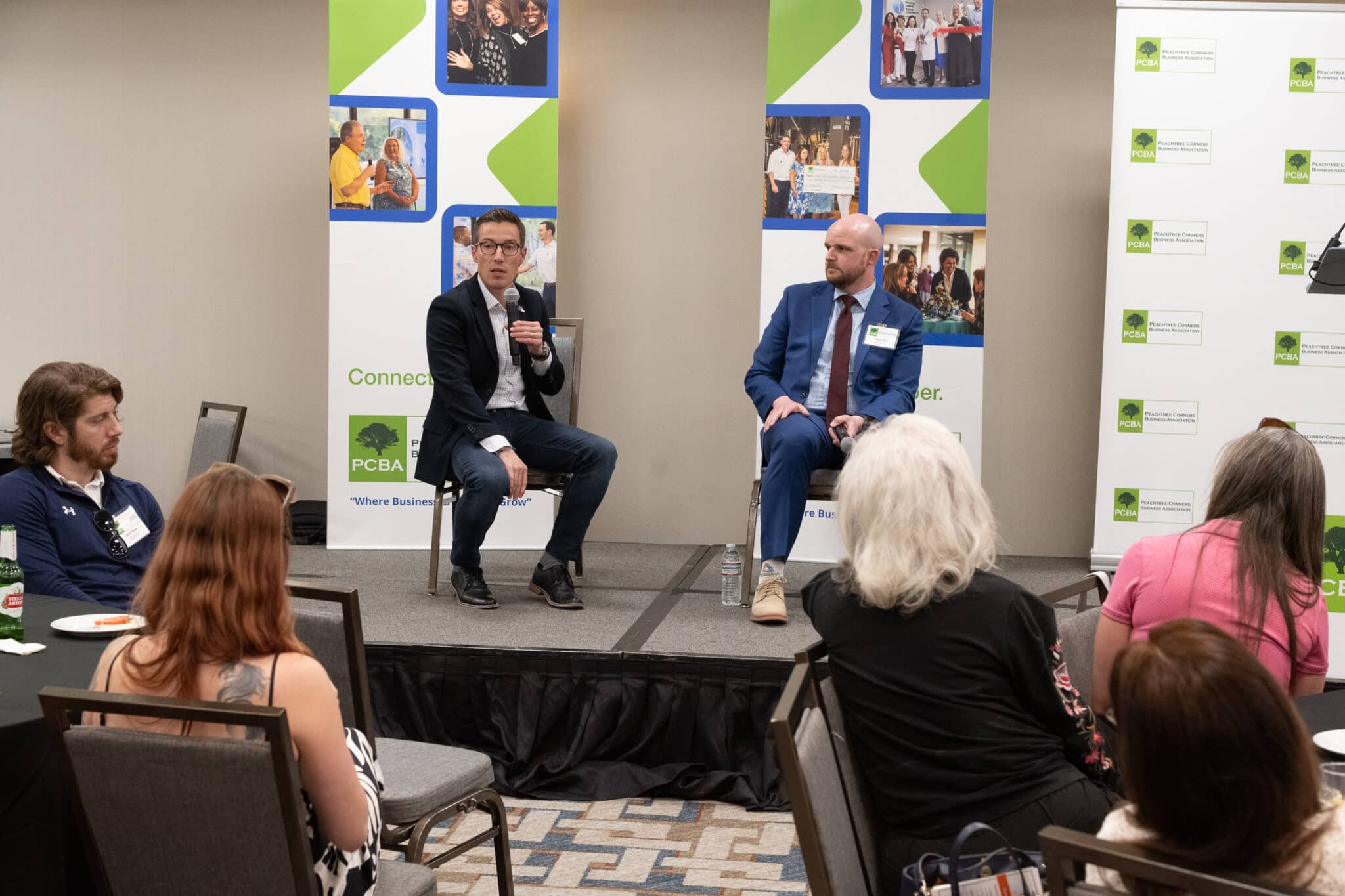
Most residents and business owners in Peachtree Corners probably think they know all about the economic development and strategic planning of Peachtree Corners, but do they really?
Peachtree Corners Business Association invited Peachtree Corners Economic Development Director Betrand Lapoire and Partnership Gwinnett Director of Economic Development Andrew Hickey to its After Hours Speaker Series on March 27 to discuss the city’s growth from a 1971 master plan to a bustling city with 42,000 inhabitants and 40,000 jobs.
Key points included the importance of business retention and expansion, with 24 projects last year creating 1,600 retained jobs, 1,600 new jobs and $250 million in new capital investment.
The Curiosity Lab, a world-class innovation center, was emphasized as a significant attraction. The city’s zoning and infrastructure plans were also discussed, focusing on balancing office and residential development to maintain a vibrant, sustainable community.
Matching jobs to residents
Although Peachtree Corners is just a teenager in terms of being an incorporated city, the foundation for this vibrant, fast-paced economic hub was laid more than 50 years ago by technology pioneer Paul Duke.
“Peachtree Corners was the first master-planned, business innovation technology park in metro Atlanta,” said Lapoire. “It was in response to the brain drain of technology with Georgia Tech graduates leaving the area.”
While the city may have a small-town feel, it’s the largest in Gwinnett County by population, but not land mass, he added.
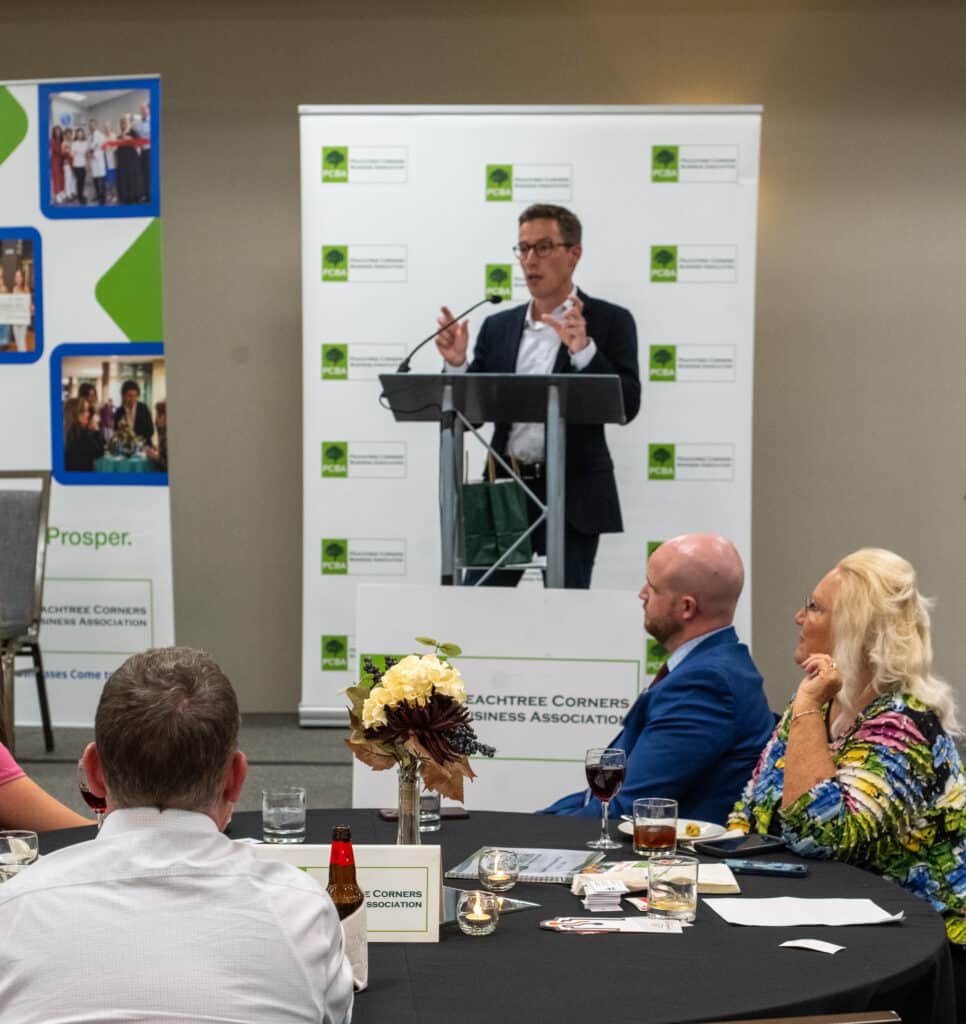
“The city started from a commercial, industrial, R&D base and then was expanded around it,” said Lapoire.
Though home to more than 42,000 residents, most of the jobs in Peachtree Corners are filled by people who live outside the city, he added.
“So we have this interesting mismatch, in a way, although not unusual,” said LaPoire. That creates traffic and transit issues. So that means that one of the solutions is to create more jobs here to fit the profile of the community.”
He presented charts that show professional services, consulting and engineering as the largest job categories. The next tier of businesses are wholesale and manufacturing.
“So we have a good mix of industry,” he said.
A five-year plan
The city has a five-year economic development plan (2023-2028) that outlines strategies for attracting and retaining businesses, with education and workforce development being key components.
Partnership Gwinnett has similar goals as Peachtree Corners, but on a larger scale.
“We are the county’s sales and marketing arm for all 17 cities now, and we receive funding from both municipal sources as well as existing businesses here — both in Gwinnett and outside of Gwinnett as well,” said Hickey.
He shared how Partnership Gwinnett is designed to drive a lot of major corporations toward doing business inside and with Gwinnett County.
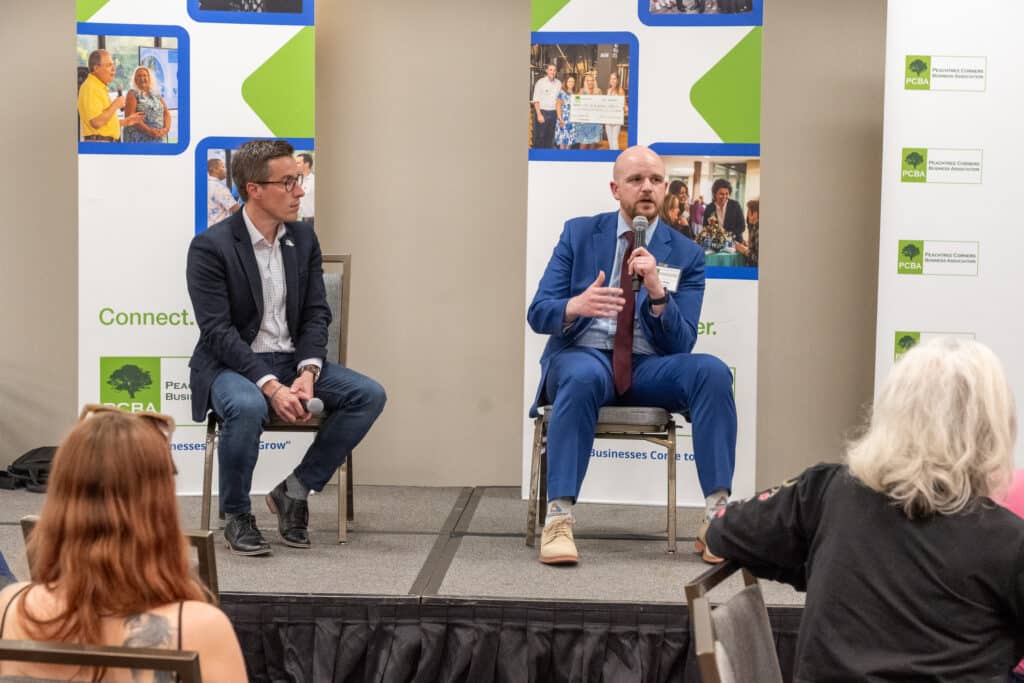
“One of the biggest things that we talk about that I’m sure it seems like most of us here, if you live here, you work here, you understand it. It’s the diversity that exists here in Gwinnett,” he said. “With a diversity index of 85, that means if we walk out of the Hilton here and we say hello to somebody, there’s an 85% chance they’re from a different ethnic or cultural background than ourselves, which to you and I may seem normal because that’s the life that we live in.”
He added that for companies, there’s a tremendous value in that, whether they have stated values, or they’re just making hiring decisions to get a wide range of candidates to fill those roles. Additionally, because of the proximity to Atlanta, Gwinnett County has a great labor draw.
Partnership Gwinnett
Partnership Gwinnett plays a significant role in recruiting businesses, expanding existing companies and developing the workforce. Hickey showed how the organization was involved with more than 24 projects last year.
“A majority of those were expansions, and that is a common thread you’ll see in economic development,” he said. “In business retention, expansion is so vital to working with our existing companies to make sure that they have the resources they need.”
He added that’s what leads to new investment and job creation in the community.
The organization also focuses on redevelopment projects, working with cities and the county to improve infrastructure and community amenities — especially strong educational institutions such Georgia Gwinnett College, Philadelphia College of Osteopathic Medicine and others.
Quality of life
In closing, both men stressed the importance of recruiting companies and developing the workforce, along with one aspect that means a lot but may not be as obvious — quality of life.
“It’s definitely evident that people like to work where they live — the whole live, work play experience,” said Hickey. “I joke that the part that people really have the most questions about, and are most excited to learn about, is new events at The Forum or Gwinnett Place Mall.”
Although they want to know what’s the next major company coming to Gwinnett, people REALLY want to know about how to spend their leisure time.
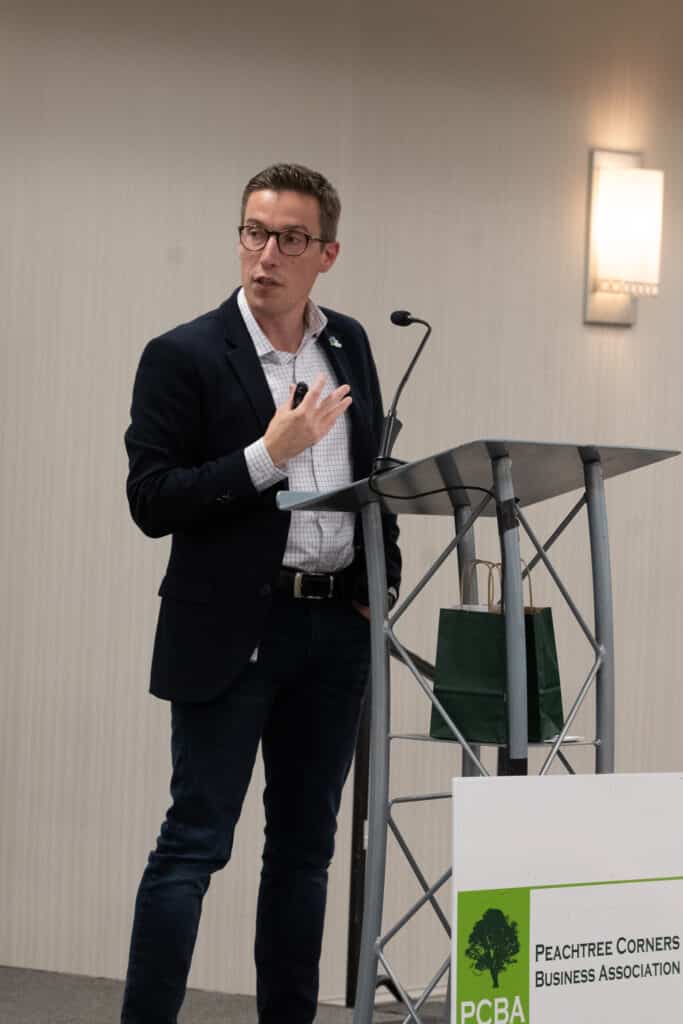
“That speaks to the importance of ensuring that we have a great community,” he said. “So at Partnership Gwinnett we work with all of our cities, and the county government as well, [on] a kind of a best-practices trip.”
He added that the peer tour allows everyone to know what the neighboring communities are doing and share the good news.
“We will take all of these elected officials, but also city staff, to different cities across the Southeast,” he said. “Last year, I believe they went to Huntsville, and have been to Greenville, Chattanooga — all cities that have done some really cool redevelopments that have taken their city to the next level. Our goal is to learn from them.”
Related
Read the Digital Edition
Subscribe
Keep Up With Peachtree Corners News
Join our mailing list to receive the latest news and updates from our team.
You have Successfully Subscribed!

From Boardrooms to the Himalayas: Vandana’s Journey to Purpose and Growing with Intention [Podcast]

Guardians of the Jukebox to Play the VoxStage on May 31

Brandon Branham Honored for Transformative Leadership in Peachtree Corners

Music Matters Productions Expands Peachtree Corners Headquarters

“Geek Culture” Shines at 2025 MomoCon

Celebration and Community: ICAGeorgia Wraps Up School Year with Two Festive Events

Vox-Pop-Uli Launches RED Initiative for Veterans’ Support

The PCBA Awards $500 to Light Up The Corners at After-Hours Event

Vox-Pop-Uli Launches RED Initiative for Veterans’ Support

The PCBA Awards $500 to Light Up The Corners at After-Hours Event

“Geek Culture” Shines at 2025 MomoCon

Celebration and Community: ICAGeorgia Wraps Up School Year with Two Festive Events

Guardians of the Jukebox to Play the VoxStage on May 31

Music Matters Productions Expands Peachtree Corners Headquarters

Brandon Branham Honored for Transformative Leadership in Peachtree Corners

From Boardrooms to the Himalayas: Vandana’s Journey to Purpose and Growing with Intention [Podcast]

Light up the Corners [Video]

Capitalist Sage: Business Leadership in Your Community [Podcast]

Cliff Bramble: A Culinary Adventure through Italy

Top 10 Brunch Places in Gwinnett County

A Hunger for Hospitality

THE CORNERS EPISODE 3 – BLAXICAN PART 1

Top 10 Indoor Things To Do This Winter

The ED Hour: What it takes to Remove Barriers from Education







